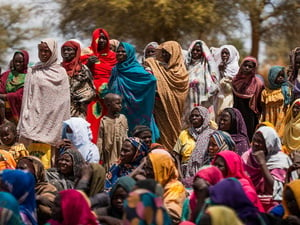Afghanistan: Need for shelter assistance before winter
Afghanistan: Need for shelter assistance before winter
It may seem premature in mid-August to start thinking about winter, but it's certainly on the minds of the 1.6 million Afghans we've helped return home so far this year - 1.4 million refugees and 200,000 internally displaced returnees. Many of them are going back to destroyed homes and villages and are going to need shelter assistance before winter weather sets in, in three or four months. This year, UNHCR is working to provide shelter for up to 400,000 of these returnees. It's a real race against time to ensure that needy Afghans have the shelter they need to get through the winter.
To shelter these 400,000 most needy Afghans, UNHCR and its NGO partners are distributing 50,000 shelter kits containing building materials to help them reconstruct their homes. To get the shelter kits into the field - and here we're talking about some very remote places - we've so far made agreements with 15 NGO partners to identify the most needy families and distribute the kits. Each kit contains 30 wooden poles, a door and two window frames, in addition to the necessary nails and tools.
We originally planned to distribute 97,000 kits this year. But with the number of Afghans heading home exceeding expectations, we've halved the programme in order to ensure adequate funds to provide travel assistance for the enormous number of returnees. We still plan to spend $35 million for the shelter programme this year. This is an operation that pits us against Afghanistan's worn-out infrastructure as we work to get supplies into the country amidst an enormous repatriation movement of thousands of returning Afghans each day.
We've already shipped 240 metric tons of nails to distribution points throughout the country, along with 240,000 door hinges and tens of thousands of tool kits, each containing a hammer, shovel and pick-axe.
From outside South Asia we've purchased 40,000 cubic metres of timber (beams and lintels) of which more than 13,000 cubic metres have already arrived in Pakistan ports. All of it is being trucked into Afghanistan. We're still short of some 263,000 beams. We're seeking regional suppliers for this huge order. Other materials, like doors, windows and latrine pipes, are also being purchased regionally. We're funding local carpentry workshops where Afghan craftsmen are building the doors and windows.
As you can see, this is a mammoth operation focusing on providing shelter for needy Afghans who have returned to rural areas. In Kabul Province, where areas like the Shomali Plain were devastated by years of war, we've so far identified partners who can distribute 14,300 shelter kits. Others are going into Eastern Afghanistan, where we're sending at least 10,500 kits. Northern Afghanistan around Mazar-i-Sharif, will receive at least 8,000 kits, while western areas around Herat will get some 7,000. Kandahar will get some 1,200 kits, and the region around Ghazni - between Kandahar and Kabul - will receive at least 750 kits.
The basic plan is that families will make the necessary mud bricks themselves. Once they've rebuilt their homes up to about shoulder height, our NGO partners will then hand over the kits so that returnees can construct the roof and the necessary support beams.
In some devastated regions of the central highlands such as Bamyan, families have been given tents for use while they're rebuilding. We've also distributed tents to returnees to the Shomali Plain. All the refugees going home under the UNHCR-Transitional Authority initiative have already received two plastic tarpaulins in their returnee packages.
To date, more than 1.4 million Afghans have returned, primarily from Pakistan and Iran, since UNHCR and the Transitional Authority started helping the refugees to repatriate last March. More than 200,000 internally displaced persons (IDPs) have also gone home under the joint return programme with the help of UNHCR, IOM and other agencies. Another more than 400,000 displaced Afghans have returned without assistance, joining an estimated 200,000 refugees who have spontaneously repatriated.
We still require some $50 million for our operations in Afghanistan and to assist Afghan refugees this year. Our total budget for 15 months ending in December 2002 is $271 million.









